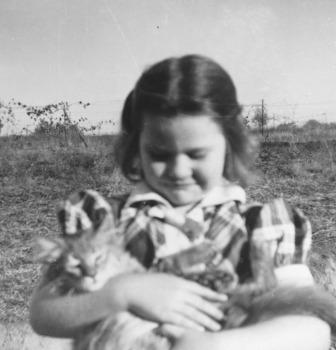
At your service
I read an article the other day about a woman who was suing a big-box store that made her leave because she had a cat with her—a service cat. The cat was on a harness and sat peacefully in the cart seat, and the woman would stroke her to stop panic attacks from post-traumatic stress disorder. The cat’s company was the only way she felt safe to go about the errands we all take for granted.
This started me thinking about other services that cats could do. Everyone knows it is difficult to train a cat. But it can be done. Otherwise you would never see cats in the movies. What would Breakfast at Tiffany’s be without its nameless cat? Or Homeward Bound without Sassy? Plus we have all seen the YouTube videos of cats being trained with a clicker and patience. So why do we automatically assume cats would not want to help? The evidence is clear that some do.
A friend of mine has a son with autism. One girl in his group at school who also has autism has been greatly helped by her family’s cat. After a tornado hit their community in Oklahoma last spring, she was terrified every time it rained, and her family enlisted the cat to help pull her out of it. My friend often takes one of her cats to her son’s school group, and everyone loves him. But this girl shows him special attention as he sits by her while they are doing art. She is very fond of drawing cat pictures.
One of the most bittersweet tales of a cat providing humans with attention and care is the case of Oscar. He lives in a Rhode Island nursing home that specializes in patients with dementia. Of the six cats in residence, Oscar is the only one who will tell the staff of a patient’s imminent death. At first they thought it was a fluke, but Oscar soon proved that he knows who needs special assistance. He will scratch at a patient’s door until he is allowed in to lie beside them until they are gone.
In his book Making Rounds with Oscar, Dr. David Dosa offers no solid scientific explanation for Oscar’s behavior. He suggests that the cat, like dogs that reportedly can smell cancer, is able to detect ketones, biochemicals given off by dying cells. Instead of discouraging Oscar, the nursing home staff knows what it means, and patients’ relatives and friends sometimes praise Oscar in death notices and eulogies. There are many stories of so-called “angel cats” throughout history, and when Steven King was writing Doctor Sleep, he used Oscar’s story to create a companion for the main character.
I have read quite a few stories about cats that can detect when a person is going to have a seizure, or when a diabetic needs insulin. Companionship and affection for dealing with sorrow, depression, grief, and PTSD are the most obvious services a cat offers, and the most mentioned. In fact, almost everyone I know who has a cat (or two or three) has stated that their cats have saved their lives in some way—mine have for me.
The legal jury may still be out on whether cats can be legitimate service animals, but I have no doubt they are more than qualified for the task. I see living proof every day that they can save lives and minds.
Kat Brown of Albuquerque is a lifelong animal-lover, especially of cats. Share your cat stories or comments at katskorner88@gmail.com.
